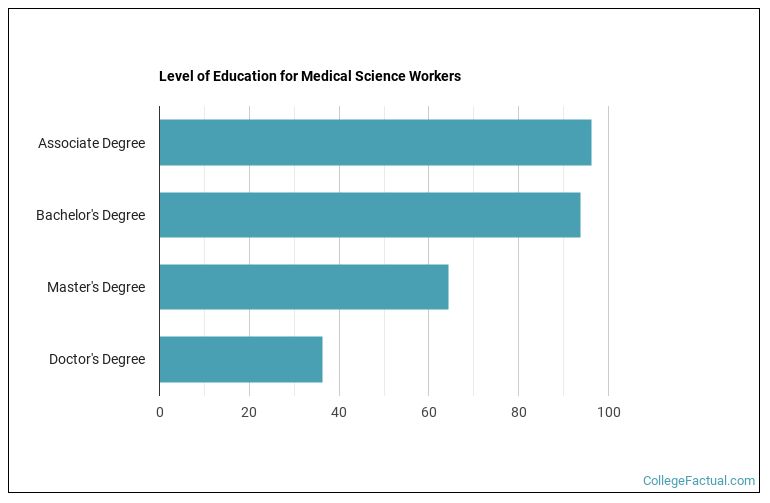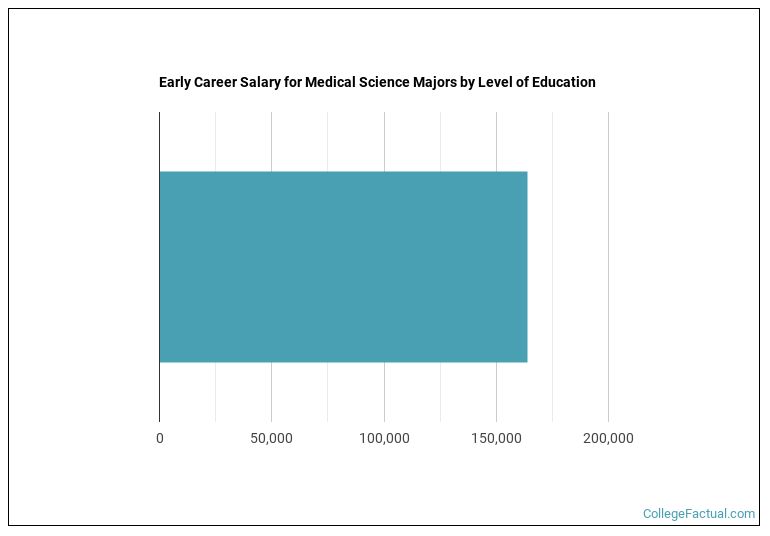 by our College Data Analytics Team
by our College Data Analytics TeamMedical Science was the 255th most popular major in the 2021-2022 school year. Colleges in the United States reported awarding 1,051 degrees in this year alone.
Our 2025 Best Medical Science Schools ranking analyzes 23 of these schools to determine the best overall colleges for medical science students. Explore this or one of our many other custom medical science rankings further below.
When studying Medical Science, you’ll learn that understanding written sentences and paragraphs in work related documents will help you be successful in a wide range of jobs. Required skills include communicating effectively in writing as appropriate for the needs of the audience and using logic and reasoning to identify the strengths and weaknesses of alternative solutions, conclusions or approaches to problems.
A high school diploma or equivalent is typically required for most medical science degree programs and many students will need a minimum GPA and SAT/ACT score depending on the school. Specific medical science careers may require a certain level of degree attainment or additional certifications beyond that.
There are many different medical science degree levels. Medical Science programs offered by schools range from a to a , which is the highest medical science degree you can get. Different medical science degrees vary in how long they take.
| Degree | Credit Requirements | Typical Program Length |
|---|---|---|
| Associate Degree | 60-70 credits | 2 years |
| Bachelor’s Degree | 120 credits | 4 years |
| Master’s Degree | 50-70 credits | 1-3 years |
| Doctorate | Program required coursework including thesis or dissertation | At least 4 years |
A master's degree is the most common level of education achieved by those in careers related to medical science, with approximately 27.4% of workers getting one. Find out other typical degree levels for medical science workers below.
| Level of Education | Percentage of Workers |
|---|---|
| Master’s Degree | 27.1% |
| Bachelor’s Degree | 26.9% |
| Doctoral Degree | 19.0% |
| Post-Doctoral Training | 17.1% |
| Associate’s Degree (or other 2-year degree) | 2.6% |
64.4% of medical science workers have at least a master's. See the chart below for the most common degree level workers in medical science have received.

The education level required is different depending on the medical science career you are seeking.
Want a job when you graduate with your medical science degree? Medical Science careers are expected to grow 12.1% between 2016 and 2026.
The following options are some of the most in-demand careers related to medical science.
| Occupation Name | Projected Jobs | Expected Growth |
|---|---|---|
| Medical Scientists | 136,100 | 13.4% |
| Natural Sciences Managers | 62,300 | 9.9% |
| Epidemiologists | 6,600 | 8.2% |
Recently graduated medical science students earned an average of $163,758 in <nil>. Earnings can range from as low as $66,337 to as high as $332,843. As you might expect, salaries for medical science graduates vary depending on the level of education that was acquired.

Salaries for medical science graduates can vary widely by the occupation you choose as well. The following table shows the top highest paying careers medical science grads often go into.
| Occupation Name | Median Average Salary |
|---|---|
| Natural Sciences Managers | $139,680 |
| Medical Scientists | $96,420 |
| Epidemiologists | $75,690 |
With over 154 different medical science degree programs to choose from, finding the best fit for you can be a challenge. Fortunately you have come to the right place. We have analyzed all of these schools to come up with hundreds of unbiased medical science school rankings to help you with this.
One of 34 majors within the Health Professions area of study, Medical Science has other similar majors worth exploring.
| Related Major | Annual Graduates |
|---|---|
| Nursing | 319,502 |
| Health & Medical Administrative Services | 88,600 |
| Practical Nursing & Nursing Assistants | 85,339 |
| Allied Health Professions | 83,905 |
| Allied Health & Medical Assisting Services | 83,587 |